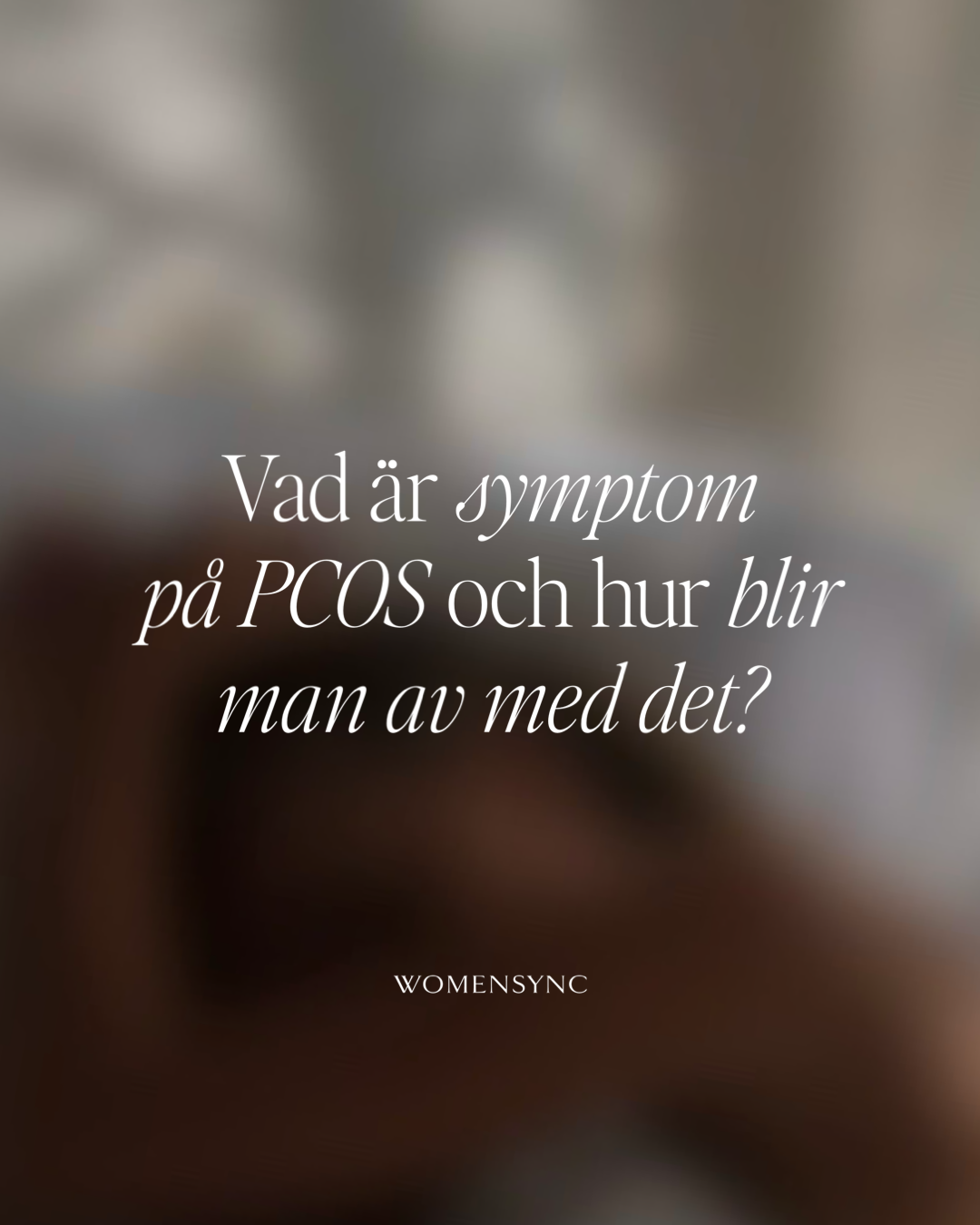This is a guest article written by Maria Särén at Emanera and Livakliniken .
The likelihood that you know someone with PCOS, or perhaps have it yourself, is high. Namely, it is a hormonal imbalance that increases and today it is estimated that around 4-20% of women of childbearing age have PCOS ¹ . Many women who are diagnosed are told that they should see their gynecologist again when/if they want to get pregnant, as it can be a bit difficult for those with PCOS to time ovulation for pregnancy. Unfortunately, most people do not get more information than that. What does PCOS mean, is it just "the way you are"? If it depends on something, can you do something yourself? Yes you can.
What are symptoms of PCOS?
Hair growth in areas and in patterns you don't usually have, irregular menstruation, fatigue, acne, mood swings, depression are all symptoms of the hormonal imbalance PCOS. It is a syndrome which is the same as saying "a collection of symptoms". Many people with PCOS have acne, especially on the jawline, or increased hair on the upper lip, chin or around the nipples. You can also have difficulty getting pregnant, lose hair on your head and have small skin flaps on your neck and around bra straps. Of course, not everyone has all the symptoms, but it varies from person to person.
In the past, PCOS was often linked to obesity, and that it would be one of the symptoms. Today we know better! There is a large percentage of women with PCOS who are of normal weight - women who could previously fall between the chairs. PCOS has nothing to do with weight, it has to do with what is happening in the body.
To be diagnosed with PCOS, you need to agree to at least two of the following symptoms:
- Infrequent or absent periods
- Increased hairiness/acne and/or elevated androgens in sampling
- Polycystic ovaries
This is based on the Rotterdam criteria, which have been criticized ² as a diagnosis according to these criteria can be made without the presence of elevated androgens ³ . PCOS means elevated androgens, you can have infrequent/absent periods and PCO ovaries (read more about what defines PCO below) without having elevated androgens and PCOS. So to fully confirm a PCOS diagnosis, the safest thing to do is to do a sample.
Although PCOS is something that is often discovered when it manifests itself in the menstrual cycle, it is not really a "menstrual cycle problem". Instead, this affects the whole body and every woman has her own story.
What is PCOS and what causes it?
PCOS is about having problems with ovulation . PCO stands for many small follicles and means that no egg is big enough to be released. In order to ovulate, the egg needs to reach a certain size and that is precisely what becomes the problem with PCOS. The eggs start to ripen but then it's like someone presses pause, and nothing happens.
We get our period about two weeks after ovulation, unless you're pregnant of course, but if we don't ovulate, it's common for the period to be irregular. There are women who have regular bleeding despite PCOS, but for most there is a delay between periods.
The cause of PCOS
There are several reasons why you can get PCOS, but the common one is that you have too much of "male" sex hormones, so-called androgens. In PCOS, you therefore have elevated androgens, which can be seen either through blood tests or through symptoms. This, in turn, makes it common to have oily skin, mood swings, acne and increased hair growth as symptoms.
PCOS due to blood sugar problems
For the vast majority of women, PCOS is due to problems with blood sugar . When we have problems with blood sugar, we also have problems with a hormone called insulin. This in turn affects our ovaries so that we get too much testosterone, and it is the testosterone that causes the maturation of the eggs to be put on pause and ovulation not occurring. So this is the same mechanism that drives type 2 diabetes and again it doesn't just affect the ovaries, it affects the whole body.
PCOS due to stress
For other women, it's not blood sugar issues that mainly drive their PCOS, it can also be stress . Too much stress in relation to too little recovery can cause the adrenal glands (and not the ovaries) to produce these androgens, or male sex hormones. Again, this affects the whole body and not just your ovaries, although that is where the problem is often found.
PCOS after hormonal contraceptives such as the pill
There are also those who get PCOS after stopping hormonal contraceptives (such as birth control pills or hormonal IUDs). This applies to you who did not have any PCOS symptoms before, but it appeared after you stopped the contraceptive. This type of PCOS is transient, meaning it heals on its own within a year or so. If, however, you had PCOS before birth control, and the birth control was used to relieve the symptoms, well then it hasn't gone away. This means that it remains but is not noticeable as long as you take contraception.
Genetic factor for PCOS
We also have a genetic factor in PCOS which means that some people get it more easily under certain circumstances. Our genetics don't predetermine it, it just increases the risk. The genes do not have the last word, we can influence a lot through our diet and lifestyle, which we will get into below.
How to treat PCOS?
It is possible to get rid of PCOS, that is, to get back a strong and stable ovulation and get rid of its symptoms! Here are some tips:
- Stabilize blood sugar by reducing sugar and fast refined carbohydrates.
- Make sure you get enough protein. One tip is to start the day with a breakfast that consists of protein and fat to stabilize blood sugar the first thing you do.
- Recover! Create space for a routine or hobby that you do daily for recovery. Reducing stress in all its forms is an important aspect for PCOS.
- Get moving, this also supports blood sugar. It can be a walk, yoga, pilates or any other movement you enjoy.
- Be careful with your sleep. Make sure to get at least 8 hours of sleep and sleep at the right times. This also helps the body balance hormones and blood sugar.
What kind of diet should you eat for PCOS?
Depending on what drives one's PCOS and what one's life situation looks like, one has to adapt the diet to one's conditions. For some, a diet with fewer carbohydrates is better suited to balance blood sugar, while others can eat a little more carbohydrates. So it's not about completely excluding carbohydrates, but that it can be powerful to reduce them. How much depends, as I said, on who you are.
In general, you can say that if you eat unrefined and clean food, that is, food that has not been processed, then you have come a long way. The biggest trap is breakfast food, which often contains a large amount of fast carbohydrates. Rather, choose something that contains protein and good fats, for example a Womensync breakfast you can find under the recipes here in the menu.
Is it difficult to get pregnant with PCOS?
Because ovulation is delayed in PCOS, it can be difficult to get pregnant. However, we can influence our PCOS with diet and lifestyle so that we become symptom-free and get our ovulation back. When ovulation works again, we can also get pregnant! This is a continuous work, if you have PCOS once, you also have to deal with it. If you wish to be symptom-free, this means that diet and lifestyle changes become part of your "new life".
With PCOS, you can have irregular ovulation and can then get pregnant if you manage to hit the right time with fertilization at ovulation. The difficult thing is to know when ovulation occurs in order to be able to time sex. Best of all, we can influence our PCOS with diet and lifestyle to become symptom-free and regain regular ovulation. When ovulation is regular, it will also be easier to time your fertile window and ovulation. This is of course a continuous work - be patient and consistent, the results will come! If you have received a PCOS diagnosis once, it is something you need to deal with. To stay "symptom-free" it often means that the diet and lifestyle changes become one of one's "new life"
What is the difference between PCOS and PCO?
PCO stands for polycystic ovaries, which is a term that means you have many small follicles. PCOS is the syndrome, a collection of symptoms due to elevated androgens, male sex hormones. PCO means, just like PCOS, that you don't ovulate, but that doesn't have to mean elevated androgens. Instead, it may be due to having a HA, hypothalamic amenorrhea as the underlying cause. Other causes can be, for example, hypothyroidism and you can also experience PCO temporarily when you have just stopped taking birth control pills or temporarily during high stress . PCO and PCOS are therefore not the same thing and it is important to find out what you have so that you can treat it correctly as the treatments differ.
To learn more about how you can heal PCOS, you can find more information here on the blog and on Womensync's instagram . For personal guidance, you can take help from the author of this post, Maria Särén at Emanera.se , who can help you step by step to deal with the symptoms.
Sources
1) The Prevalence of Polycystic Ovary Syndrome: A Brief Systematic Review , Journal of human reproductive sciences
Ritu Deswal, Vinay Narwal, Amita Dang, Chandra S Pundir
https://pubmed.ncbi.nlm.nih.gov/33627974/
2) The Prevalence of Polycystic Ovary Syndrome: A Brief Systematic Review , Journal of human reproductive sciences
Ritu Deswal, Vinay Narwal, Amita Dang, Chandra S Pundir
https://www.ncbi.nlm.nih.gov/pmc/articles/PMC7879843/
Polycystic ovary syndrome, article in Läkartidningen written by Ylva Strandberg, specialist doctor; ST doctor, Johanna Schmidt, PhD student, specialist doctor Eva Dahlgren, Chief Medical Officer; all at the Women's Clinic, Sahlgrenska University Hospital, Gothenburg.
https://lakartidningen.se/wp-content/uploads/OldWebArticlePdf/1/17573/LKT1151s2726_2729.pdf
3) The Pathogenesis of Polycystic Ovary Syndrome (PCOS): The Hypothesis of PCOS as Functional Ovarian Hyperandrogenism Revisited, Rosenfield RL, Ehrmann DA. https://pubmed.ncbi.nlm.nih.gov/27459230/

